
Wizarding Notes
Official Blog of the Wizarding School for Composers


How to Compose Like a Professional
Without fluency in both technique AND process, you can’t compose like Michael Giacchino, for instance, and take on a project like Rogue One last minute — with only 4½ weeks to score and record it — and then complete it while still working steady hours of 9 AM-6 PM.


Well, maybe I can write today...
Composing is not magic. It is a behavior. More specifically, composing is a collection of actions and behaviors—improvising, sketching, notating, revising, etc.—that may lead to a deliverable outcome—a printed score, a live performance, a mastered track, etc.

